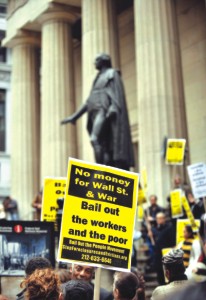| Economy
The Idiot's Guide to the Financial Crisis
Faruq Hasan
Unless you've been living in a cave--and a deep, dark one at that too--words like credit crunch, subprime and liquidity crisis have slowly crept into your lexicon. You can't help but be surrounded by doom and gloom every time you open the newspaper or tune in to your local news channel. So what does it mean for the Bangladeshi Joe Six Pack and his savings? Are we really “decoupled” from the global economy or are the soothsayers right and we are merely a step away from our own financial crisis albeit with a local flavour?
To really understand the crisis, one must go back to where it all started: post 9/11 New York. In an effort to save the US economy from going into a shock after the terrorist attacks, George Bush appealed to American patriotism by urging the US citizens to do the one thing Americans loved doing anyways: spend away their savings. A couple of years later, he made a famous speech to the Congress about the virtues of home ownership. The American Dream can't be complete without your own home with money borrowed against your savings, and preferably with an SUV (or two) parked in the garage. What didn't get as much press coverage were the behind the scene economic tinkering: slashing of the interest rates which were already pretty low, commercial banks offering attractive loan packages to families who previously couldn't dream about owning their own homes, and subsequently selling off these debts as bonds to investment banks.
Giving loans to households who had a higher risk of repayment is known as subprime lending, and even up to a couple of years earlier, this was extremely lucrative which earned a fee for each mortgage the banks sold. This was the first step in the creation of a housing “bubble”: people started owning homes that they actually couldn't pay off with real money. They were sitting on a mountain of credit that they had hardly qualified for but that was ok, because everyone knew that the only way housing prices can ever head is up. Consumers felt immune and they started taking a second mortgage on their homes (remember they hadn't even paid up for it yet) and upped the consumption ante in general.
And then the inevitable happened: the bubble burst. Real incomes, which were already sluggish, began stagnating, and suddenly our new homeowners realised they no longer have cash to pay off their debts. Then came the dreaded F word: foreclosure. Overnight banks began repossessing these houses and people literally became homeless. Credit began drying up as the same banks that had peddled loans from door to door began turning away perfectly legitimate customers applying for a housing loan. A domino effect followed that brought in the liquidity crisis: because of the sudden discovery of risks attached to loans in general, the banks have suddenly stopped lending to each other.
Why is liquidity such a big deal? The banks have assets that are already worth hundreds of billions of dollars so surely the subprime crisis is a mere drop in the ocean for them. Well think of it this way. While you're walking down the street, Bill Gates pulls up next to you in a taxi and asks for a loan of 200 Taka since he's left his wallet back home. As a good-hearted Bangladeshi you probably will give him the money, but as a cold hearted capitalist, your first reaction is to ascertain the chances of you getting your money back. And there lies the rub: the subprime crisis has severely dented the confidence of both consumers and lenders. Although there's still plenty of capital around, both consumers and banks are staring at each other warily, not wanting to make the first move.
The origins of the financial crisis might be as American as apple pie but the consequences are global. Remember earlier how commercial banks sold off the home loans as bonds in the international bond market? Well, it turns out that many of the buyers were global investment banks like Lehman et al., firms which until recently were deemed solid and safe. Overnight, even small investors have found out that their holdings in some of these institutions have suddenly become worthless.
So is the financial crisis coming to a bank near you? The good news is: probably not. First of all, Bangladeshi banks are not really involved in big time financial instruments. We have a pretty insulated stock market that still runs on old-fashioned speculation and the rumour mill. In addition, banks in Bangladesh have come a long way as far as regulations and credit control is concerned.
But there are some obvious dangers ahead. If you're in the garment or textile business, you're probably going to be worried by the fact that a majority of your customers (the EU and the US) are suddenly cash strapped and have started haggling with your prices. This is where local financial instrument must come up to bat for the export sector. There are several ways of doing it. One is to devalue the Taka in relation to the dollar and further entice American importers who have newly discovered nationalising their industries running up to the elections. Another option may be to make it easier for countries like China and Japan who are already feeling the credit pinch to move their factories to Bangladesh in order to save costs, especially on wages and employment benefits which are already reaching a ceiling. But for everyday consumers like you and me, we can pretty much go about our daily business without having to fear our homes sealed up. And judging by the fervour surrounding Eid shopping this time around, I don't think my advice is really necessary.
Copyright (R) thedailystar.net 2008
|
